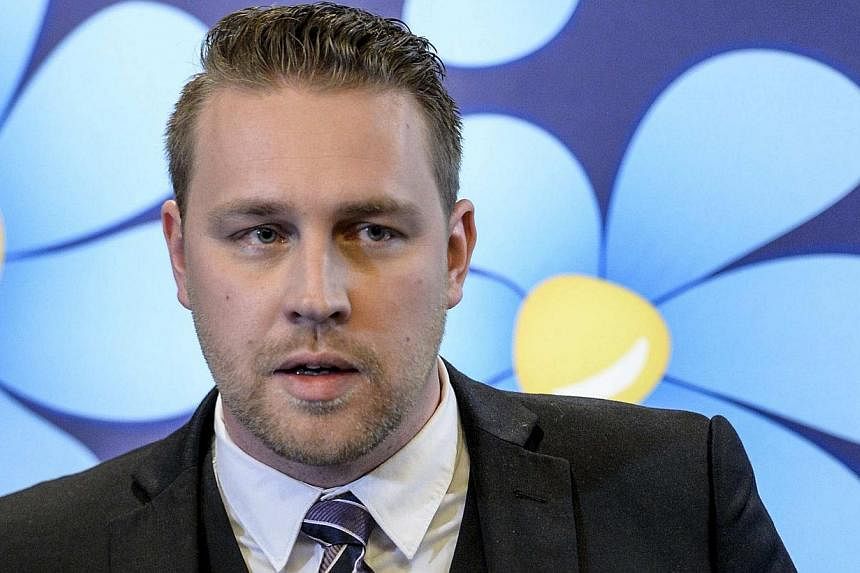STOCKHOLM (AFP) - Sweden, long known for tolerance and stability, faced political turmoil on Thursday after a far-right party brought down the government and forced the first snap elections in half a century.
Social Democrat Prime Minister Stefan Loefven, voted into office just two months ago, called the March 22 election on Wednesday after the Sweden Democrats, who oppose his liberal immigration policies, refused to back his budget in parliament.
The first snap election since 1958 showed the clout of the Sweden Democrats who, despite their leftist sounding name, are a populist and far-right party.
Their influence underlined how Sweden has now joined a growing club of European countries with powerful anti-immigrant movements.
Riding a wave of popular concern over an influx of refugees and other foreigners, the Sweden Democrats reacted to their defeat of the government by vowing to turn the polls into "a referendum on immigration".
"This is not a single-issue focus since the policy that is being carried out (on immigration) has a huge impact on all other issue areas," said Mattias Karlsson, interim leader of the Sweden Democrats, which became the nation's third-largest party in elections in September.
SHOCK FOR SWEDEN
The new-found clout of anti-immigrant sentiments has come as a surprise to a society that cherishes its reputation for tolerance and openness to the outside world.
"I'm afraid that people won't vote. You get a feeling of hopelessness with what is happening. You think: what does it matter who I vote for, if they then go and do what they want," 42-year-old salesperson Malin Voegt told AFP.
However, an influx of immigrants has sent the issue shooting up the agenda. Sweden, with a population just shy of 10 million, is expecting nearly 100,000 asylum seekers this year, many of them Syrians who automatically receive residency on arrival in the Nordic country.
A survey of 1,500 Swedes by polling service Novus in September showed 34 per cent in favour of receiving fewer refugees, while 28 per cent wanted more, and 32 per cent considered the current level appropriate.
The rise of the far right means Sweden is becoming more like other European countries, according to Ulf Bjereld, a political scientist at University of Gothenburg.
"Sweden has been without this type of radical right-wing party for longer than large parts of Europe, so you could say that Sweden has become more normal after getting this party," he told AFP.
But the development bodes ill for Sweden's much vaunted stability.
Both left and right blocs in parliament have publicly declared their refusal to work with the Sweden Democrats in any manner, setting up the country's politics for potentially long-term lingering paralysis if the party maintains its current strength.
"We're really going to need to make changes if we don't want to find ourselves in the same situation that is benefitting the extreme right," said Jan Wettmark, a local conservative politician from central Swedish town Arvika.
'DESTRUCTIVE POWER'
The mass-circulation Dagens Nyheter said the budget vote reflected the significant "destructive power" of the Sweden Democrats, and their willingness to use this influence.
"The party can bring down governments and make it hopeless for others to even try to rule the country," the paper wrote in a commentary.
In an interview with Swedish daily Dagens Industri, French Economy Minister Emmanuel Macron compared the growing clout of the Sweden Democrats with the rise of National Front in France.
"They exist because people voted for them. We have the same situation in France," Macron told the paper.
"But you should never try to compromise with these people, because they are liars."
He said it was difficult times for Europe and hard to be in government, because of concerns in the public about ailing economies and the consequences of globalisation.
Although this will be the first time in six decades that Sweden holds snap elections - and coming so soon after September's vote - a survey suggests voters are taking the turmoil in stride.
Sixty-nine per cent of the 1,022 Swedes surveyed Wednesday by polling institute Demoskop approved of the call for new elections, saying this was a way out of the political impasse.
Olof Ruin, a political scientist at Stockholm University, said the situation in Sweden was "unique", with the divide between the left and traditional right in parliament leaving the Sweden Democrats with the balance of power.
"It's sad since Sweden has been known for its ability to compromise," he told AFP.
"It could have a negative impact on the voters, who might start believing that the politicians are unable to solve the problems."

